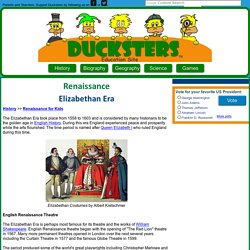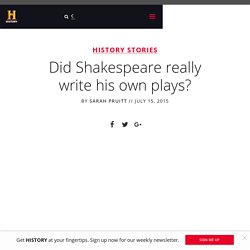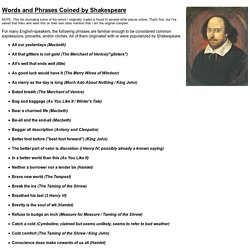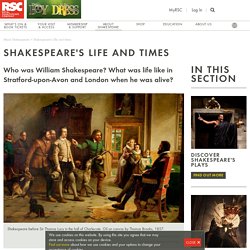Zoom
Trash

Renaissance for Kids: Elizabethan Era. History >> Renaissance for Kids The Elizabethan Era took place from 1558 to 1603 and is considered by many historians to be the golden age in English History.

During this era England experienced peace and prosperity while the arts flourished. The time period is named after Queen Elizabeth I who ruled England during this time. Elizabethan Costumes by Albert Kretschmer English Renaissance Theatre The Elizabethan Era is perhaps most famous for its theatre and the works of William Shakespeare. Why Shakespeare loved iambic pentameter - David T. Freeman and Gregory Taylor.
Shakespeares Globe Theatre. 'Anonymous' and the great Shakespeare debate. Conspiracy theories about large, global events get thrown up time and again. True, it’s easy to be taken in by new evidence, but usually flaws are eventually exposed and these theories then fade away until new ones come along. So in some ways you really have to applaud Roland Emmerich’s new film ‘Anonymous’.
In it, William Shakespeare, often thought of as the greatest writer in the English language, is shown not to be the author of his famous plays. In other words: a fraud. It’s certainly a bold move, and you have to admire Emmerich’s loyalty to the subject. In the film (which came out this month), the true author is said to be Edward de Vere, the Earl of Oxford, a claim that is seconded by many ‘anti-Stratfordians’ (people who believe that Shakespeare was a fraud).
As well as concentrating on de Vere though, the film also raises questions about Shakespeare himself. There are currently six known examples of Shakespeare’s signature proving that unlike his family he wasn’t illiterate. Did Shakespeare really write his own plays? - Ask History. Most scholars accept that William Shakespeare was born in Stratford-upon-Avon, and spent time acting in London before returning to Stratford, where he lived until his death in 1616.

But actual documentation of his life is pitifully scarce: little more than several signatures, records of his marriage to Anne Hathaway and the birth of their children, a three-page will and some business papers unrelated to writing. Above all, nothing has been found documenting the composition of the 37 plays and 154 sonnets attributed to him, collectively considered the greatest body of work in the history of the English language.
London Travel Guide: The Globe Theatre with Dan Snow. Shakespeare's Coined Words in Depth. Words Shakespeare Coined From The Shakespeare Key. Charles and Mary Cowden Clarke. Shakespeare, with the right and might of a true poet, and with his peculiar royal privilege as king of all poets, has minted several words that deserve to become current in our language. He coined them for his own special use to express his own special meanings in his own special passages; but they are so expressive and so well framed to be exponents of certain particulars in meanings common to us all, that they deserve to become generally adopted and used: -- For then the bold and coward, The wise and fool, the artist and unread, The hard and soft, seem all affin'd and kin. -- Tr.
& Cr., i. 3. By the condensedly framed word "affin'd," Shakespeare expresses, in the first of the above three passages, 'united by affinity;' in the second, 'bound by any claim of affinity;' and in the third, 'swayed by any link of affinity.' In the above passage, the word "attask'd" succinctly expresses 'taken to task.' Words and Phrases Coined by Shakespeare. Words and Phrases Coined by Shakespeare NOTE: This list (including some of the errors I originally made) is found in several other places online.

That's fine, but I've asked that folks who want this on their own sites mention that I am the original compiler. For many English-speakers, the following phrases are familiar enough to be considered common expressions, proverbs, and/or clichés. All of them originated with or were popularized by Shakespeare. I compiled these from multiple sources online in 2003. How many of these are true coinages by "the Bard", and how many are simply the earliest written attestations of a word or words already in use, I can't tell you. A few words are first attested in Shakespeare and seem to have caused extra problems for the typesetters. The popular book Coined by Shakespeare acknowledges that it is presenting first attestations rather than certain inventions. Words like "anchovy", "bandit", and "zany" are just first attestations of loan-words. William Shakespeare's life and times. Who was William Shakespeare?

What was life like in Stratford-upon-Avon and London when he was alive? Very little is known for certain about William Shakespeare. What we do know about his life comes from registrar records, court records, wills, marriage certificates and his tombstone in Holy Trinity Church, Stratford-upon-Avon. William Shakespeare was baptised on 26 April 1564 at Holy Trinity in Stratford-Upon-Avon.
Traditionally his birthday is celebrated three days earlier, on 23 April, St George's Day. John Shakespeare married Mary Arden, the daughter of Robert Arden, a farmer from the nearby village of Wilmcote.